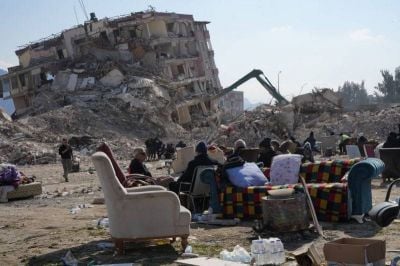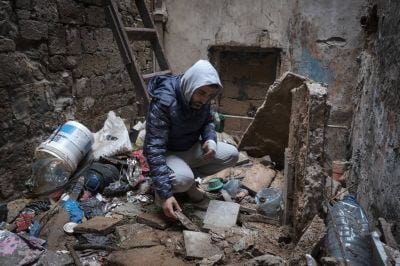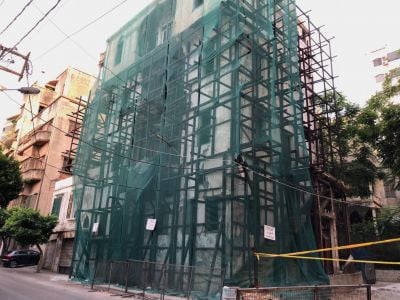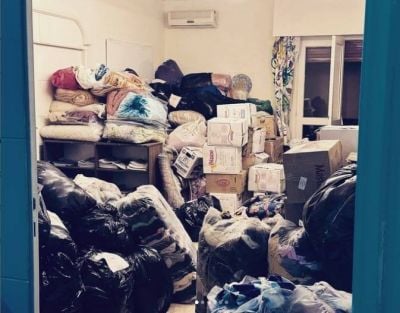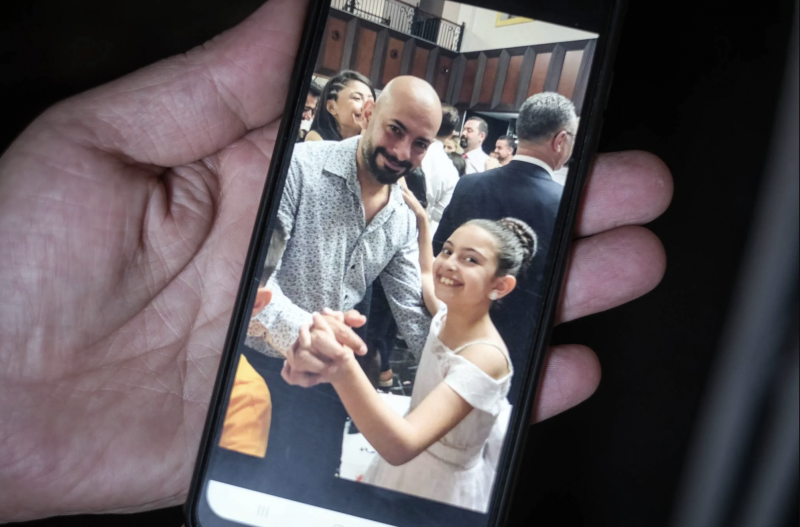
A family member shows a cell phone photo of Wissam and his nine-year-old daughter Nada attending a school dance in Antakya shortly before the Feb. 6 earthquake. Both he and his daughter lost their lives in the disaster. March 1, 2023. (Credit: João Sousa/L’Orient Today)
RAJM AL-KHALAF, Akkar governorate — Wissam al-Asaad and his extended family were close.
They visited each other often, flying the distance between Antakya, where Wissam had a home with his wife and two kids, and his childhood village in a mountainous corner of northeastern Lebanon, where his parents still live.
Now all they have left of Wissam are a manila envelope of old photos and a freshly planted headstone down the road.
He and his preteen daughter, Nada, died one month ago on Feb. 6, when a massive 7.8-magnitude earthquake reverberated near Gaziantep, southern Turkey, just after 4 a.m.
Within minutes, entire cities in Turkey and neighboring northern Syria were leveled to piles of debris — Antakya included. Poorly constructed concrete apartment blocks crumbled atop sleeping families. More than 50,000 people were killed.
At least 16 of them were Lebanese citizens, as well as three Palestinian refugees with Lebanese travel documents, Lebanon’s ambassador to Turkey Ghassan Moallem tells L’Orient Today.
Half of those 16 citizens were from Lebanon’s north.
Here, in the country’s northernmost Akkar governorate, grieving families say their loved ones were in Turkey to seek a better life.
Lebanon’s three-year economic downfall has meant medicine shortages, fuel crises and life savings vaporized by illegal banking controls. Turkey — among the few places Lebanese passport holders can travel without needing a visa — was, for some, a way out.
Wissam left Lebanon long before the country began its downward spiral in 2019.
Born in Rajm al-Khalaf, a tiny border village in an impoverished, hilly part of Akkar governorate known as Wadi Khaled, he traveled to Turkey in 1999 on a scholarship to study medicine.
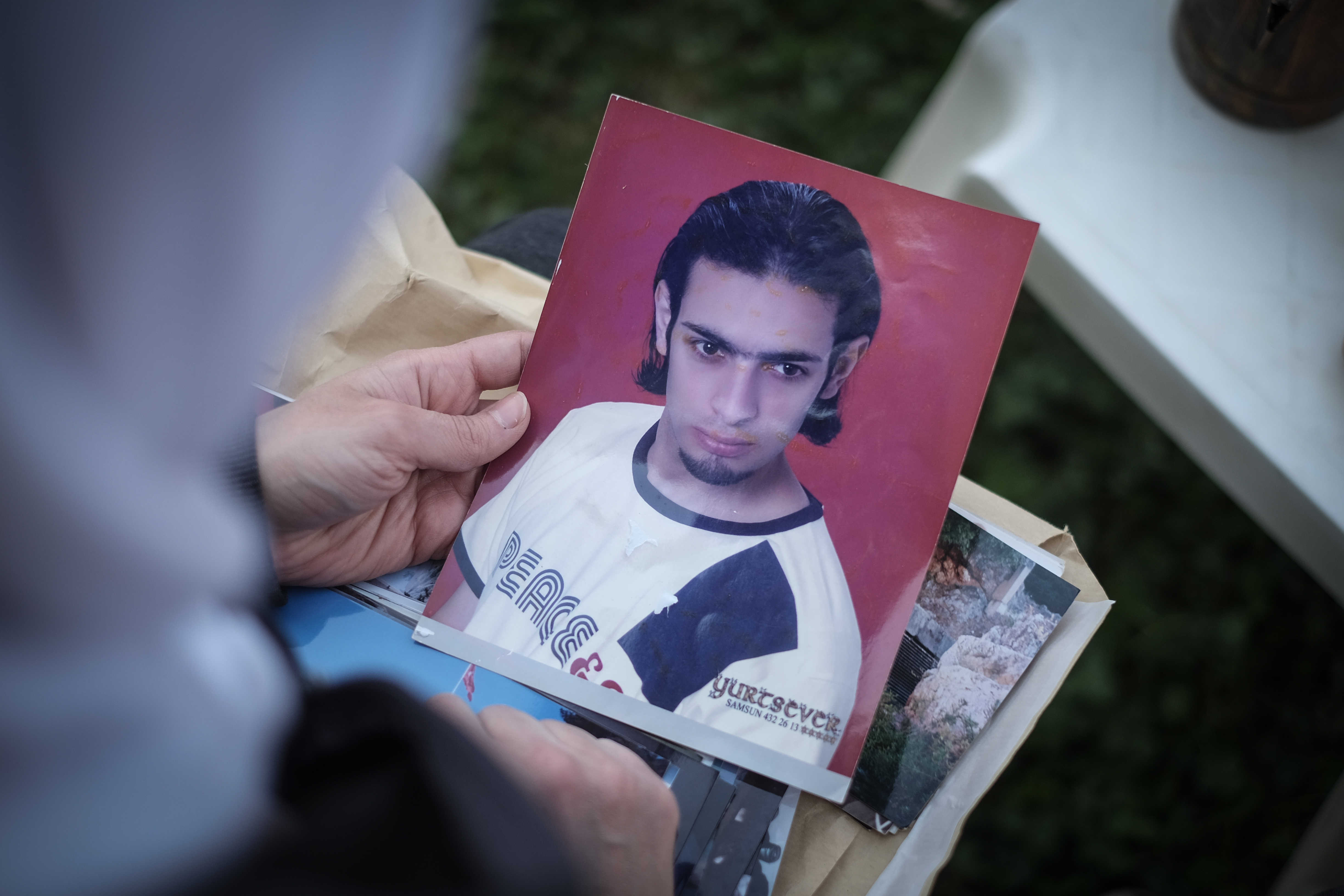 Wissam’s younger sister Rawan al-Asaad looks through old photos of him at his childhood home in Rajm al-Khalaf, Wadi Khaled. March 1, 2023. (Credit: João Sousa/L’Orient Today)
Wissam’s younger sister Rawan al-Asaad looks through old photos of him at his childhood home in Rajm al-Khalaf, Wadi Khaled. March 1, 2023. (Credit: João Sousa/L’Orient Today)
Two decades later, he was a respected orthopedic surgeon with a Turkish wife, a nine-year-old daughter named Nada who played piano and excelled in school, and a six-year-old son named Mohammad.
The family lived in Antakya, a city known for its religious and ethnic diversity, and where Arabic is spoken alongside Turkish.
Wissam and Nada both died in the earthquake last month, family members in Rajm al-Khalaf tell L’Orient Today. His wife and son survived, despite serious injuries that landed them in the hospital.
Before the earthquake, the family’s story was one repeated countless times across Lebanon — a generation of siblings strewn across the country and international borders.
At one point, despite Lebanon’s worsening economic crisis, Wissam considered returning to Lebanon to open a medical clinic, family members say.
“I’m one of the people who convinced him not to come back to Lebanon,” Fadi, Wissam’s uncle, tells L’Orient Today at his home in Rajm al-Khalaf.
“He loved his country. He’d tell me it’s better to live in Lebanon and make ‘just enough to get by’ than to stay abroad.”
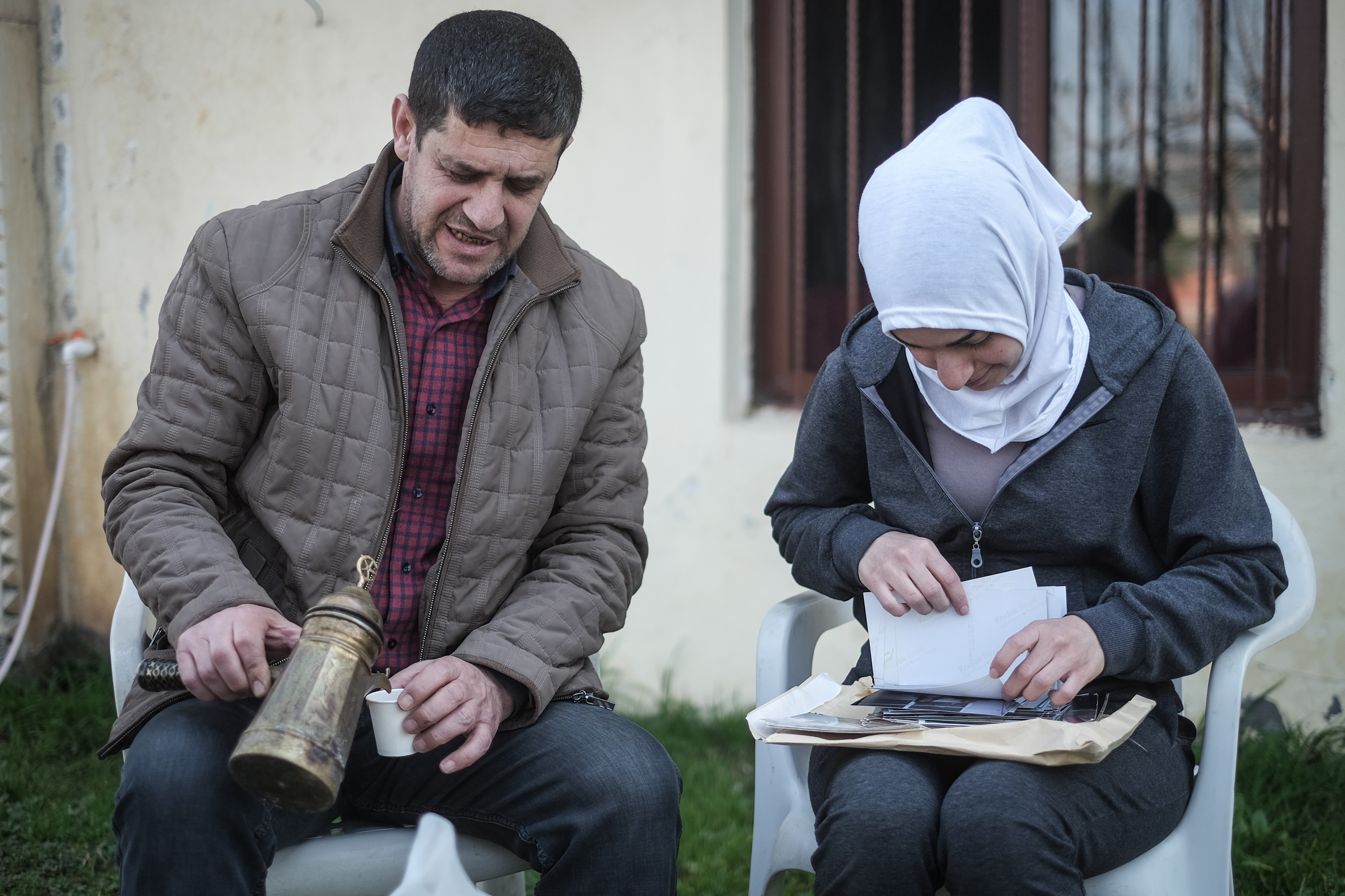 Wissam’s uncle Fadi al-Asaad and younger sister Rawan al-Asaad look through old photos of him at his childhood home in Rajm al-Khalaf, Wadi Khaled. March 1, 2023. (Credit: João Sousa/L’Orient Today)
Wissam’s uncle Fadi al-Asaad and younger sister Rawan al-Asaad look through old photos of him at his childhood home in Rajm al-Khalaf, Wadi Khaled. March 1, 2023. (Credit: João Sousa/L’Orient Today)
On a sunny morning in March, nearly one month after the quake, Fadi smokes cigarettes and sips coffee in his large living room, pristine with velour sofas lining the walls.
He says the house shook violently during the quake last month, waking him up and prompting him to check social media. When he learned that the epicenter of the earthquake was in southern Turkey, “I automatically thought about Wissam and his family.”
“I tried to contact them to see what happened, if they were okay.” But there was no signal, and Wissam wouldn’t pick up the phone. “The last text I sent him was ‘tamena aanak,’” he says. “Let us know you’re okay.”
He opens the chat on his phone where he had sent the message. It’s a blank white screen, except for Fadi’s text. Wissam never responded.
Outside, the noontime call to prayer echoes from a loudspeaker. About a dozen men gather at the door of a nearby mosque to wash in preparation.
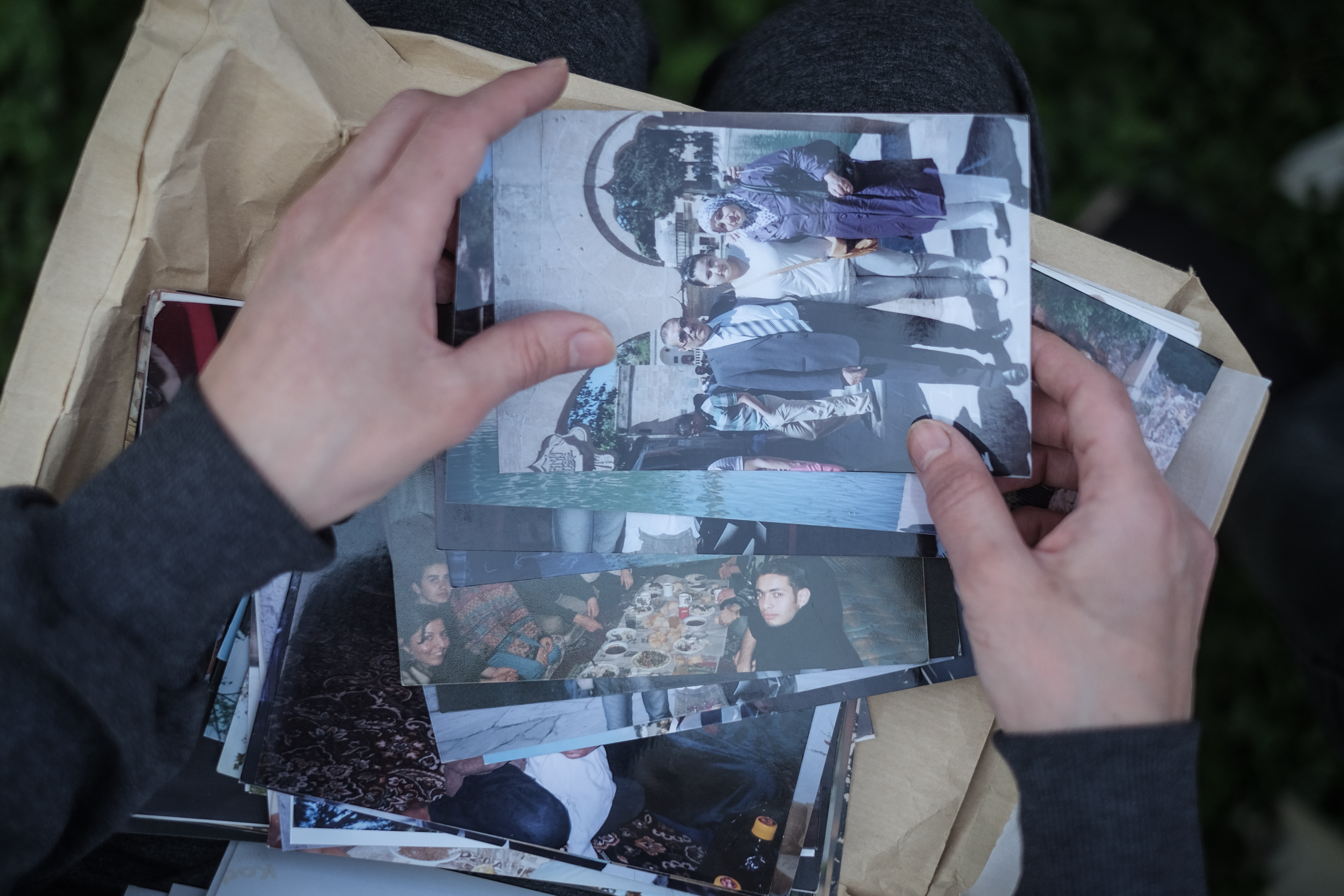 Wissam’s younger sister Rawan al-Asaad looks through old photos of him at his childhood home in Rajm al-Khalaf, Wadi Khaled. March 1, 2023. (Credit: João Sousa/L’Orient Today)
Wissam’s younger sister Rawan al-Asaad looks through old photos of him at his childhood home in Rajm al-Khalaf, Wadi Khaled. March 1, 2023. (Credit: João Sousa/L’Orient Today)
“We’re finding comfort in the Quran,” says Rawan, Wissam’s 30-year-old sister, who spent some time with Wissam and his kids in Antakya just days before the earthquake. Wrapped in a white hijab and matching grey sweatsuit, she holds back tears.
Steps from the village’s mosque, Rawan and her mother huddle together at the small local cemetery, on a hill overlooking a green valley. Wissam’s grave is the newest one, the family explains, pointing toward the back of the cemetery, in front of a tree. It’s bright white.
Several thousand people from the area gathered here in February for the funeral after Wissam’s body was returned to Rajm al-Khalaf, the family says. His daughter Nada was buried in Turkey.
The women leave Wissam’s grave and return home, where they set up coffee and plastic chairs in the garden. Rawan ducks inside for a few minutes and comes back to the garden carrying a stack of pictures in a tan envelope.
Wissam as a kid posing in a faded photo with his siblings, Wissam as a young man with a late-1990s goatee and gelled hair, Wissam in a big wood-framed wedding portrait with his bride.
The more recent photos — Rawan’s favorites — are all on her phone. Him in scrubs performing surgery, posing with his kids, eating at restaurants with relatives. In some, he faces away from the camera.
“He didn’t like having his picture taken,” Rawan says.
Wissam’s wife, Yeter, and son, Mohammad, are still in the hospital, though the family is hoping to bring them to Lebanon once they’ve recovered. Rawan and her relatives say they’ve tried to comfort them but there’s little they can do, as Yeter speaks only broken Arabic.
“We can’t speak very much together, but she’s very kind,” says Rawan. “We’re hoping she can be able to keep going in life with Mohammad.”
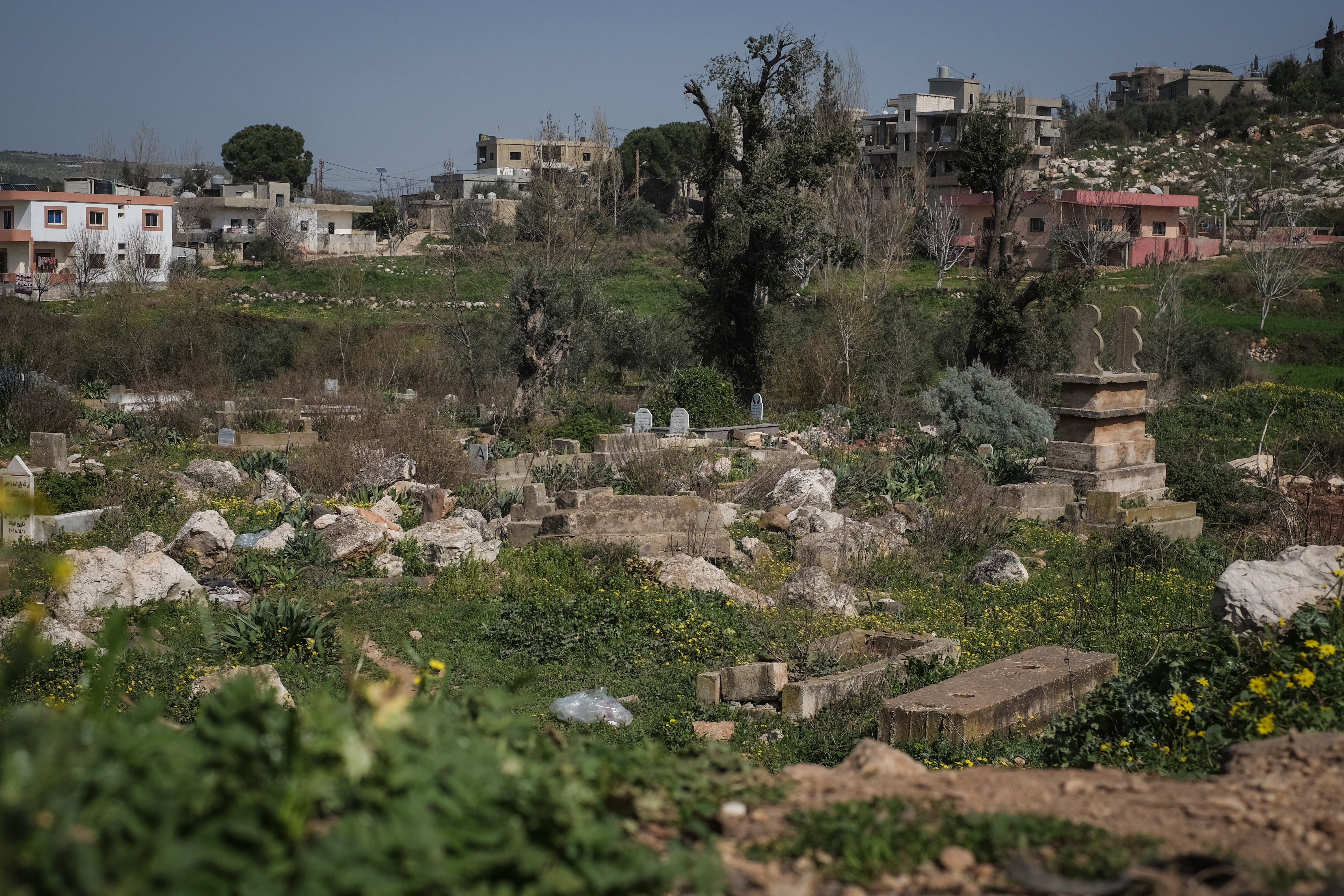 The cemetery in the Wadi Khaled village of Rajm al-Khalaf where Dr. Wissam al-Asaad’s family buried him last month. March 1, 2023. (Credit: João Sousa/L’Orient Today)
The cemetery in the Wadi Khaled village of Rajm al-Khalaf where Dr. Wissam al-Asaad’s family buried him last month. March 1, 2023. (Credit: João Sousa/L’Orient Today)
About two hours away, in Tripoli, Wissam’s brother, Anas, is among the siblings who still lives in Lebanon. He flew to Turkey on Feb. 6, just hours after the earthquake, to find his brother and check on the family.
He found block after block of buildings reduced to rubble, he says.
Yeter and Mohammad had already been rescued alive, but it soon became clear that Wissam and Nada were still trapped under the debris. When workers finally pulled their bodies out, it was too late. Anas and a doctor friend struggled to find a morgue with any free space.
“Everywhere was bodies,” he says. “Bodies, bodies, bodies.”
They drove Wissam and Nada to the city of Adana, where they hoped to find help at the airport.
“God only knows what I was feeling. I was glad that at least I had found him. I imagined him and his daughter laughing together with me, that I was smiling. I thanked God.”
Finally, he managed to arrange Nada’s burial with relatives in Turkey. And when they got Wissam’s body aboard a plane to Lebanon, several others were loaded alongside him, headed home.
By that Friday he was buried in Wadi Khaled.
He hasn't yet had time to process the loss. “My brother is a doctor, and his life in Turkey was good. He was respected,” says Anas. “He left Lebanon and stayed in Turkey so he could live.”
“What can I say? If you leave, you’re done for. If you stay in this country, you’re done for.”
Additional reporting contributed by Amanda Haydar and Michel Hallak.
